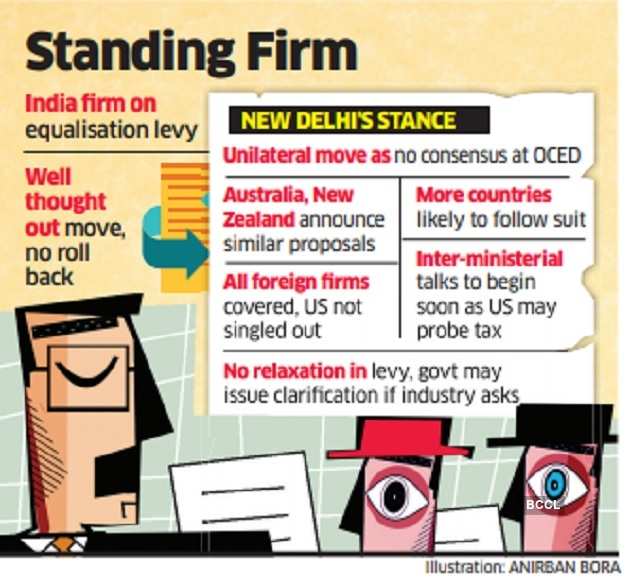
The Central Board of Direct Taxes, which has specified jurisdictional authorities for the equalisation levy, will soon notify the relevant form for payment in line with the deadline. Besides, the levy does not single out any country and applies uniformly.NEW DELHI: India is undeterred by the US launching an investigation into its tax on digital transactions, or equalisation levy, covering companies such as Netflix and Amazon, government officials said. The government expects many other countries to adopt the same position, they said.
Australia and New Zealand have already proposed digital taxes and more countries are likely to follow suit, disappointed with the progress on the framework for this at the Organisation for Economic Cooperation and Development (OECD). The US had on Tuesday initiated investigations into 10 nations and blocs including India that have imposed such taxes or are in the process of doing so. They include the UK, Brazil and the European Union.
“Countries have had to resort to unilateral levy because there is no consensus at the OECD… The US proposal to make the digital tax optional has made it more difficult to reach consensus,” said one official. “It was a well thought out move.”

The 2% , or so-called Google tax, came into effect from April 1 and the first payment deadline is July 7. The government had earlier imposed a 6% levy on digital advertising. This is aimed at taxing digital companies based overseas on the business they do in India.
The Central Board of Direct Taxes, which has specified jurisdictional authorities for the equalisation levy, will soon notify the relevant form for payment in line with the deadline. Besides, the levy does not single out any country and applies uniformly.
“There’s no reason why we should roll back the levy… All foreign companies are covered under it,” one of the officials said. “It is a valid tax so why should India budge?” said another official.
Trade experts said India is well within its rights to impose the equalisation levy and will be able to muster a strong defence.
“First, the US has not been singled out and the tax is applicable to all countries. Second, the tax is within our commitments to the World Trade Organisation,” said an expert on trade issues.
TALKS STALLED
Talks on the digital tax have not moved forward much because of the US insistence on making the proposed framework optional. Most countries including India have opposed the move.
A senior official told ET that more countries are likely to resort to unilateral measures if the framework is not finalised till December 31. It is expected that the deadline may be extended from the current December 31.
Source: indiatimes.com

